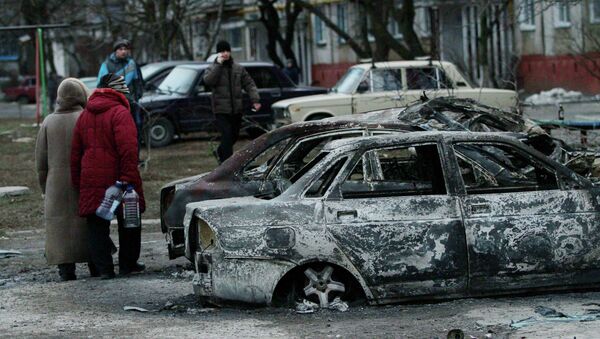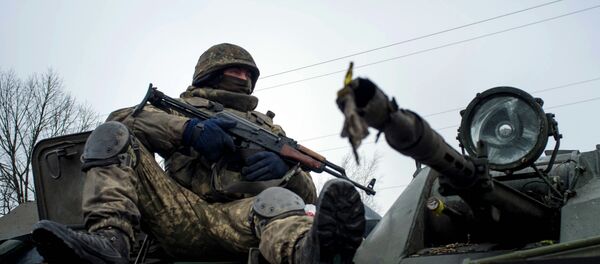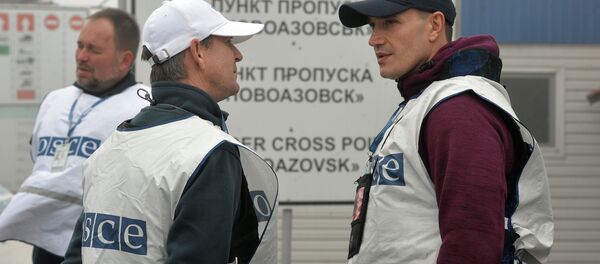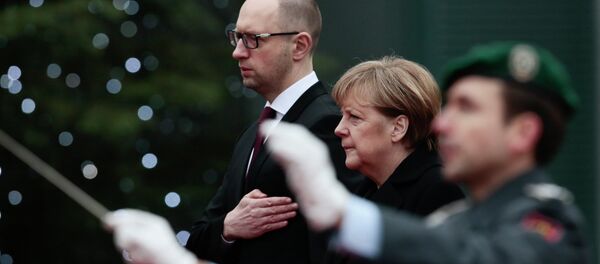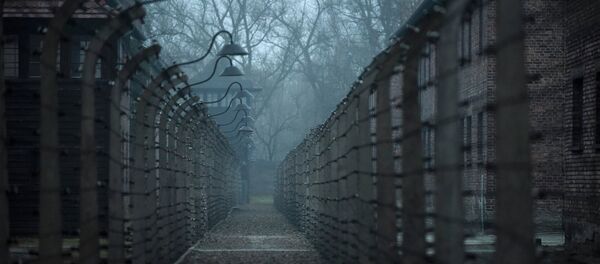OŚWIĘCIM (Poland), January 27 (Sputnik) — The United States is using Ukraine in its own interests without any concern for the fate of the crisis-hit country, Kremlin administration chief Sergei Ivanov, who heads a Russian delegation to attend the commemoration of the 70th anniversary of the liberation of Auschwitz-Birkenau Nazi concentration camp said Tuesday.
"American partners, as they are commonly called today, are using Ukraine as a [political] instrument. Ukraine itself is not really their concern."
Ivanov stressed that there were no signs that the West was eager to provide Ukraine with real financial aid.
The current Kiev authorities could "depart" at any moment, putting the burden of tackling the crisis in the hands of the Ukrainian people, he added.
US officials have said that they are providing exclusively non-lethal support to Ukraine, as well as military advice, despite allegations that US private army or mercenaries were operating alongside the Kiev forces in eastern Ukraine fighting the Donbas militia.
On Monday, US State Department spokeswoman Jen Psaki said the allegations were false and that no US troops were present in Ukraine.
The ongoing conflict in Ukraine, however complex, can be resolved if Kiev authorities hold direct talks with representatives from the self-proclaimed people's republics in the country's southeast (Donbas), Sergei Ivanov has stressed.
"Of course, there is always a chance. Hope dies last. But as of now, it is very difficult to assess this [situation in Ukraine] with a certain level of optimism…I think that the chance to stop the civil war in Ukraine lies in ending the shelling and the extermination of your own civilian population…, but apart from that, inevitably, sooner or later direct talks must start or at least contacts between Kiev authorities and the authorities of southeastern Ukraine," Ivanov told reporters Thursday.
"The mediator countries can confirm this, they can contribute [to the peace process], but they cannot solve anything," he said.
The military confrontation in southeastern Ukraine started last spring, when Kiev launched a special operation against local residents, who refused to recognize the new government, which came to power as a result of a coup in February.
Since then, a ceasefire agreement between the two sides was reached, with Russia and the Organization for Security and Co-operation in Europe (OSCE) having been the mediators in the Minsk talks, which led to the signing of the truce.
Meanwhile, Russia, Germany, France and Ukraine have been holding talks on Ukrainian reconciliation in the Normandy format.
Despite the peace efforts and the Minsk truce, fighting continues in Donbas. In January, shelling intensified in the region, with the cities of Donetsk and Mariupol having been affected the most.
The head of the Kremlin administration also expressed his concern over the threat of neo-Nazism, saying that it will grow if measures to counter its spread are not taken.
"It is a very alarming trend. I believe that this threat will only grow if no appropriate measures are taken," Ivanov told reporters in the Polish town of Oświęcim.
Ivanov also commented on the claim by Ukrainian Prime Minister Arseniy Yatsenyuk that the Soviet troops invaded Ukraine during the Second World War, saying that such allegation aims at downplaying Russia's role in the victory over Nazism.
"It is an attempt to revise the outcome of the World War II, a drive to downplay the role of Russia, as the rightful successor of the Soviet Union."
"It is a desire to pinch Russia as painfully as possible, to press the emotional points," Ivanov told reporters in the Polish town of Oświęcim.
The majority of Russians believe that this statement insults the memory of those killed during the Great Patriotic War, as it is commonly called in the country.
Russian President Vladimir Putin said on Monday that any attempts to revise Russia's contribution to the victory in the fight against Nazism during World War II should be viewed as glorification of Nazi crimes.
In December 2014, Ukraine, along with the United States and Canada, voted against the UN General Assembly resolution on fighting the glorification of Nazism.
Speaking at the event last week, Russian envoy to the United Nations Vitaly Churkin called on all UN members to back the Russia-initiated resolution against the glorification of Nazism.
The UN General Assembly's 69th session voted on Russia's resolution "Combating glorification of Nazism, neo-Nazism and other practices that contribute to fueling contemporary forms of racism, racial discrimination, xenophobia and related intolerance" in December of last year. While 115 countries voted in favor of the resolution and 55 abstained, the United States, Canada and Ukraine were the only ones to vote against it.
Moscow has repeatedly emphasized that outbursts of neo-Nazism and aggressive nationalism in Ukraine have become widespread, with far-rights group having been actively involved in the February coup in Kiev, as well as the ongoing Kiev military operation against predominantly Russian-speaking southeastern Ukraine.
Moscow has not yet made a decision on debt repayment by Kiev, the head of Kremlin administration said.
"As far as I know, the decision has not yet been made," Sergei Ivanov stated.
Russian Prime Minister Dmitry Medvedev previously announced that Russia had reasons to demand early repayment of $3 billion from Kiev, while Russian Foreign Minister Sergei Lavrov said that Moscow, in order to support Ukraine's economy, did not demand debt repayment, although it was due time.
The Kremlin chief of staff added that the $3 billion of Kiev's debt could be used by Russia to pay social benefits in the country.
"Amid the current economic situation in Russia, the Russian government could use $3 billion to fulfill all of its social obligations, including veteran payments," Ivanov said, adding that based on various credit agreements, Ukraine owes Russia $25 billion.
Meanwhile, Ukraine's Naftogaz still owes Russian energy giant Gazprom an estimated $2.44 billion for gas deliveries, according to Gazprom head Alexei Miller.
After an almost six-month break, Russia resumed gas deliveries to Ukraine on December 9, 2014, following a payment of $3.1 billion by Kiev for its large gas debt.
According to Ivanov, Russia is interested in Ukraine becoming a strong, independent country that can support itself.
